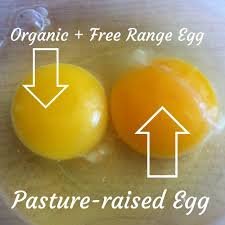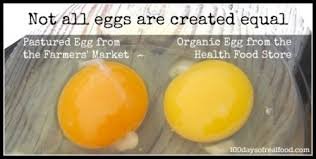
Many of us health-conscious and environmentally-aware shoppers often feel good about opting for organically grown produce.However, it’s important to know that the organic eggs from your grocery store raise some serious questions, both in terms of treatment of the hen, and the quality of the egg itself.To be labelled “organic,” the egg-laying hens must be raised in accordance with the USDA’s regulations.
In summary, these rules state:
- The hen’s diet must be free of animal by-products, synthetic fertilizers, pesticides, chemical additives, GMO foods and hormones.
- The hen cannot be subject to routine antibiotic use, often standard practice with large-scale, non-organic egg farming.
- Only natural molting is allowed — induced molting, a common practice used to extend the laying life of commercial hens, is prohibited.
- Outdoor access must be provided, however, no detailed specifications are outlined.
The net result is an egg that is free from non-organic and potentially harmful chemicals, substances, or by-products.

Organic Doesn’t Ensure Proper Treatment of the Hens
If animal welfare is part of your concern, organic labeling itself often does not always ensure humane living conditions for the hen. For example, the hens may still exist in cramped living conditions, have minimal outdoor access, or be subject to beak-clipping to protect the safety of the flock.
Once laid, other issues are introduced before that egg can appear on supermarket shelves. State regulations require commercially-sold organic eggs to be washed. This removes an egg’s cuticle — also called it’s “bloom” — which is a naturally occurring waxy seal, intended to protect the porous eggshell from external substances, and to preserve freshness.
Specific washing methods vary by state, but the cleaning process may introduce products such as chlorine, lye, sodium carbonate or hydrogen peroxide. After washing, some commercial farmers often coat eggs with substances, such as mineral oil or vegetable oil.

The Best Place to Buy Organic Eggs
Small, locally selling farmers or backyard chicken raisers tend to keep smaller flocks, which provides roomy indoor conditions and ample outdoor access. Their hens are able to engage in their natural instincts, such as foraging and dust bathing. Studies have confirmed that hens able to forage and peck for bugs to enhance their diet produce eggs with less fat and cholesterol, and more vitamin A, vitamin E, vitamin D, beta carotene and omega-3 fatty acids.
Local farmers typically also avoid washing their eggs, or they’ll use gentle washing practices and food-safe oils. This preserves the cuticle, which is so useful that fresh eggs with an in-tact cuticle don’t need to be rushed into the refrigerator.
Not everyone has a friendly neighborhood farmer nearby, so if you must rely on supermarket eggs, careful choices can help support your good intentions. Look for cartons which sport multiple, government-regulated labels; in addition to organic, meaningful labels include free-range, pasture-raised, Certified Humane, Animal Welfare Approved and American Humane Certified. Avoid non-regulated, meaningless terminology, such as farm fresh, natural, or cage-free, as well as redundant claims, such as hormone free (all commercially sold eggs in the U.S. must be hormone free).
Purchasing the best options is always a tricky process, but reading and understanding labeling can help you shop wisely.

by Debbie Swanson
http://www.liveinthenow.com/article/organic-eggs-theyre-cracked
Hi! I am a robot. I just upvoted you! I found similar content that readers might be interested in:
http://www.liveinthenow.com/article/organic-eggs-theyre-cracked
Downvoting a post can decrease pending rewards and make it less visible. Common reasons:
Submit